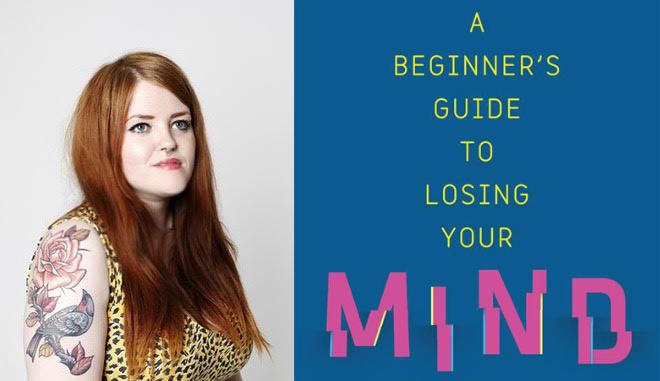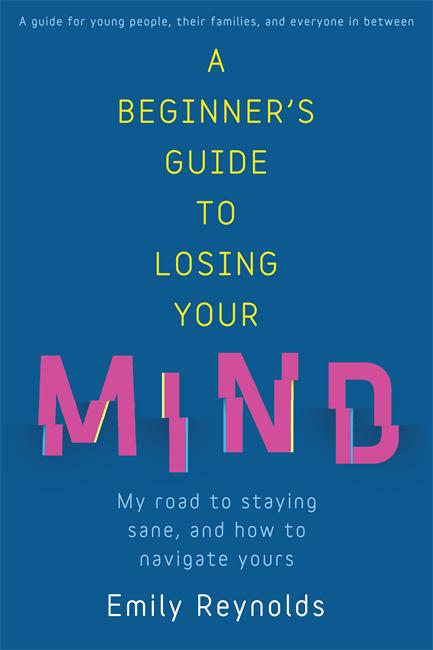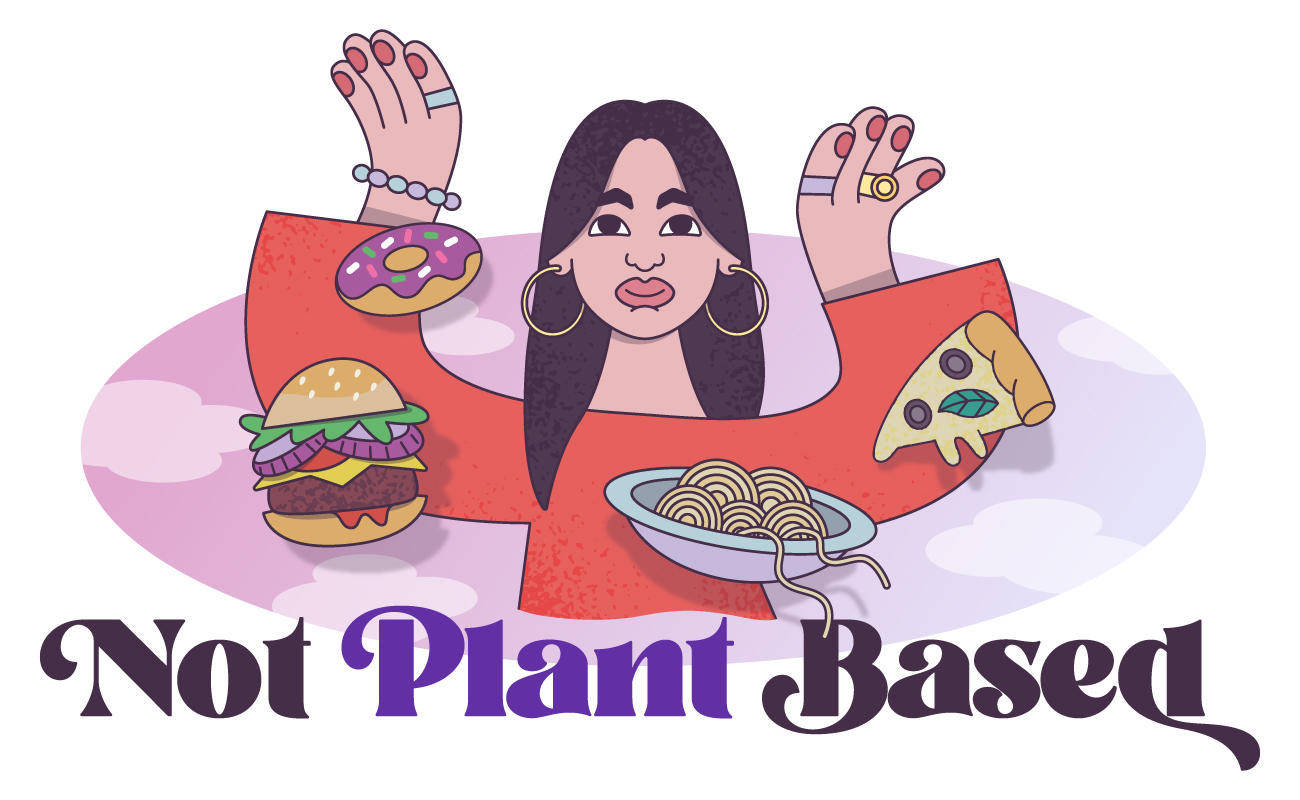
Hands-up if you’ve ever read a self-help book? If your experience is anything like mine, then you’re probably familiar with the frustration of investing a week of your life in 300 pages of someone else’s “journey” (THAT WORD) and, despite having a full, intensive understanding of their psychological development, you’re no more knowledgeable about your own. Enter journalist, mental health activist and Eve’s clever pal, Emily Reynolds. The 25-year-old writer has just celebrated the release of her very first book, entitled; “A Beginner’s Guide to Losing Your Mind”. In her early twenties, Emily was diagnosed with Bipolar following ten years of being prodded and pushed between various mental health professionals, with little-to-no benefit. Unfortunately for Emily, she’s fallen victim to plenty of idiotic, unhelpful approaches to mentally ill health, but fortunately for you, she’s an expert in how to avoid it. Hence, she’s penned her negative (and some positive) experiences to help yourself, friends and loved-ones to deal with mental illness appropriately in a practical, matter-of-fact way.
Throughout her how-to for “navigating your way to sanity”, Emily gives a subtle nod to how her relationship with food was often complicated as a result of her low self-worth and depressive tendencies. For anyone who has had first-hand experience of an eating disorder, they’ll be well aware of the fact that the fear of food is more often than not a manifestation of a co-existing or underlying mental health issue; such as depression, anxiety or even PTSD (post traumatic stress disorder). Emily’s story sheds light on the complexities of mental health – it’s never just as simple as; “thinking positively”; “going for a run” or indeed, “eating an extra chocolate bar”. As well as telling the entire world of her most painful and intimate truths, she’s also been kind enough to speak with us about how, she too, has been affected by disordered eating.
ON FOOD ISSUES
“I’ve not talked about it that much, but I’ve always had a really difficult relationship with food. As young as five I was binge eating, and that’s a habit that’s continued into adulthood. This hasn’t been helped by other mental health problems – depression has often left me unable to fend for myself in the most basic ways, so cooking any meal let alone a healthy one has always been a big challenge. I’m now an expert on really fucking weird and unhealthy dinners – there’s one instance where I half-cooked a saucepan of pasta and was so depressed I took it off the hob halfway through and started eating it, stood up in the kitchen, with a cheese grater as a fork. No sauce. No cheese. Not. Even. Cooked. It wasn’t my greatest culinary achievement. In times like that, I’m likely to turn to easy and unhealthy things like doughnuts, pizzas, takeaways e.t.c.
“MANIA HAS LED ME TO OBSESSIVELY WORK OUT”
With regards to binge eating, my depression really fed into that. I’ve used food in the same way I’ve used alcohol and to a lesser extent drugs – feeling like there’s a void inside me and trying desperately to fill it up with stuff. Obviously, eating two Domino’s pizzas in one go is not going to fill any kind of emotional void, so I was often left feeling miserable and disheartened and, as with many food related things, guilty. Mania has also led me to obsessively work out, cut down calories to a really dangerous extent and develop aversions to and obsessions with particular foods. In one particularly bad period when I was about 20, I ate literally nothing every day except a salad at lunch and a baked sweet potato for dinner, all whilst going to the gym for several hours every day. I lost a lot of weight in an incredibly dangerous way, but I was just completely obsessed. My relationship with food is a lot better now, but I still have a bunch of stuff to deal with! My eating is a lot better largely because my boyfriend loves to cook and will essentially present me with nice, healthy food every day, so I just don’t have the opportunity to sit and binge. I realise that’s an extremely short-term solution and so I’m looking into how to deal with it at a deeper level at the moment.
I have been affected by clean eating but in a different way to a lot of my friends, who have actually followed diets and so on. I’ve never actually subscribed to clean eating or any particular food fads, but it has absolutely contributed to my difficult relationship with food. One thing with binge eating is that when you do it there’s a real sense that you’ve lost control. In the moment of consumption that can be quite exhilarating, but you immediately feel incredibly guilty and start beating yourself up over your (perceived) lack of self control. Clean eating has always felt sort of out of reach for me because of this, and that’s made me feel bad. Even whilst I read brilliant articles about how damaging clean eating fads can be to mental and physical health, and read endless scientific papers debunking ideas about ‘superfoods’ or whatever, a little part of me still thinks to myself “yeah but you couldn’t achieve it even if you wanted to because you haven’t got the self control”. So even though I’ve never been affected by it directly, I think that kind of narrative is really damaging to anybody who has ever struggled with overeating or binge eating.”

ON BIPOLAR
“I have a diagnosis of bipolar type 1. What that means, in reality, is that I often get severely depressed and then occasionally have severe manic episodes, often leading to psychosis. On a day to day basis, I’d say my biggest issues are anxiety and depression – I find it hard to concentrate, to get the motivation to do even simple things, and often have panic attacks. I’ve also struggled with food, alcohol, drugs and self harm, which is pretty much a full house on the ‘totally mental’ bingo card.
It’s taken a very, very long time to learn how to do it. I feel my most stable and able to deal with things now, and it’s mainly because I’ve tried and failed to look after myself for so many years that some of the good stuff has inevitably stuck. Therapy was a really big help for me, and whilst I appreciate it doesn’t ‘cure’ anybody and some is better than others, it really helped me get to grips with my mental health and deal with non-mental health related difficulties too. I’m not currently on medication, but so many people I know have had good experiences with it – again, it’s not perfect and lots of people are mis-prescribed medication that doesn’t help them at all, but if you experiment and try a few things out it can also be a really good way of managing things.”
ON HOW TO DEAL
“I largely cope by breaking tasks down into very small parts. If I have an article to write, for example, I’ll make a list with every single step on it and try to tackle them one by one. I do this even for really small, routine tasks – showering, for example, can be really hard when you’re depressed, so I break it down: “get clean towel from drawer”, “turn on shower”, “shower”, “dry self”, “get dressed”. It sounds a bit ridiculous when you write it down, but it really does help me cope with things and is a fairly good principle for most projects. I’ve also learned not only to ask for help full stop but also how to ask for help. I often suffered alone and in silence, and hated asking anybody for help, but I’m now much more confident asking people whether they’ll help me with routine tasks or emotions that I’m struggling with. I think a lot of people feel like asking for help is an admission of weakness, but in actual fact it’s a really brave, important step to take. Ask for help! Ask your partner or your mates or a doctor: anyone. There is no shame in telling people you’re not coping and that you need their support – it can be a huge strain off your shoulders.”
“SET YOURSELF SELF-CARE REMINDERS. WORK OUT WHAT MAKES YOU CALM”
“Think of an ongoing plan to keep themselves well and happy. Set yourself self-care reminders, work out what makes you calm or helps you get to sleep, work out what will distract you through a panic attack or will perk you up when you’re depressed. Write it down, and try your hardest to do as much of it as you can without putting any pressure on yourself.
I’d also really encourage people to talk to mental health professionals, whether that’s a psychiatrist, a GP or a charity. I didn’t get any real treatment until I was in my mid twenties, and although my mental health is very far from perfect now, that treatment has made a huge and quantifiable difference. The earlier you catch it, the earlier you start to learn what helps you cope and how you can manage your mental health problems. If you have a diagnosis of bipolar or depression, you’re never not going to be mentally ill. But that doesn’t mean you can’t lead a happy, normal, stable life – it’s just a matter of learning how.”
ON SOCIAL MEDIA
“It’s a double-edged sword. Over the years social media has been a massive boost to my mental health but it is also a drain. On one hand, being able to talk about mental health so openly has been really important for me personally, and the early days of LiveJournal and MySpace and even Twitter were instrumental for me in terms of expressing and understanding myself. I’d definitely never have written a book about mental health if that hadn’t been part of my teenage years. I really appreciate that supportive community too – if I’m having a bad day, I know there’ll be someone to talk to. There’s also SO much information online, which can be really helpful for people coming to terms with their mental health or wondering whether they might have a mental health problem. It can, however, encourage problematic behaviours.
“[SOCIAL MEDIA] CAUSES A LOT OF JEALOUSY & RESENTMENT”
With the internet, I technically don’t have to go outside – I can order food, talk to friends, buy clothes without even leaving the house, which can encourage me to…not leave the house. That’s unequivocally bad for my mental health. I also feel a lot of pressure when I look at what my peers are achieving when I’m having a bad episode of mental health. It causes a lot of unwarranted jealousy and resentment for me in that respect. I worry about younger people growing up with social media being so ubiquitous. I absolutely hate “technology is evil!” scaremongering and I think on the whole technology is a force for good, but I think there’s a middle ground between it being a brilliant, flawless thing and it being terrible and damaging.”
Emily’s book, A Beginner’s Guide to Losing Your Mind (Yellow Kite, £14.99), is available to order now from amazon,co.uk. I’m only halfway through and am already considerably less mad.



